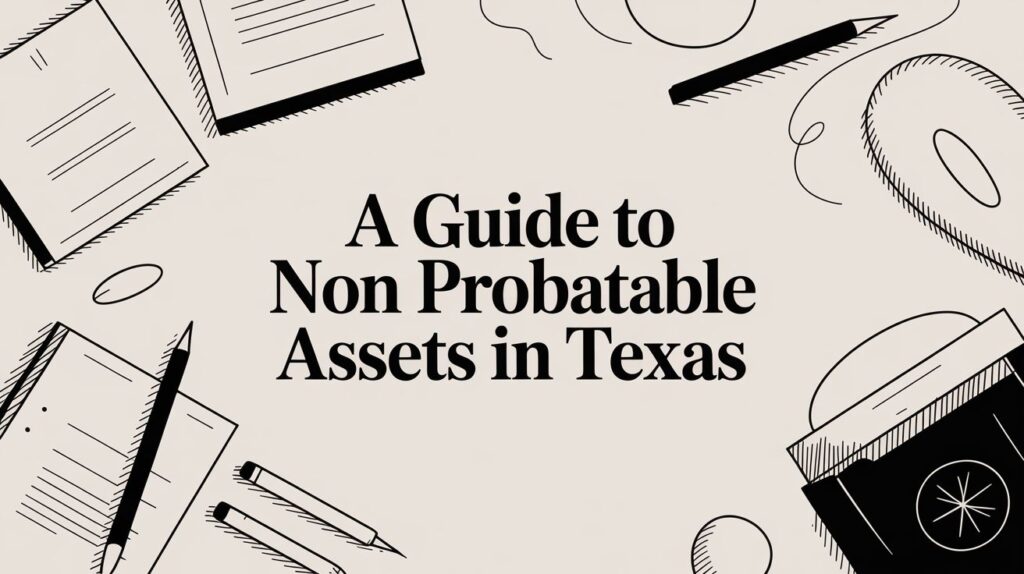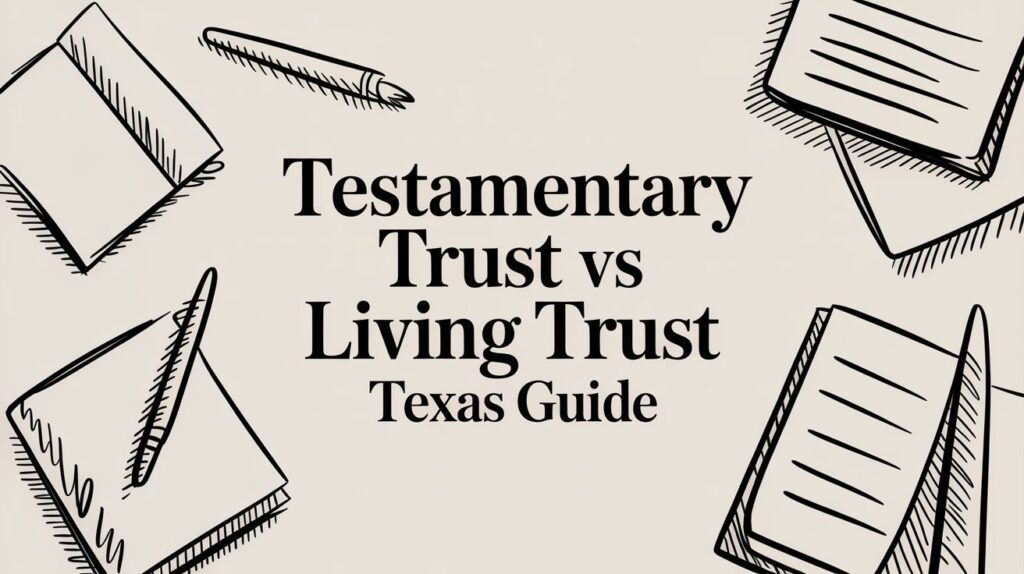If you’ve recently lost a loved one or are helping manage someone’s estate, you’re probably asking a critical question: what are the costs associated with probate in Texas? And you’re right to ask. While probate in Texas is often more streamlined than in other states, it still comes with a range of potential expenses—some expected, others not so much.
In this in-depth guide, we’ll walk through each of the typical costs associated with Texas probate, from court filing fees and legal expenses to more hidden costs like bond premiums and executor fees. We’ll also break down practical ways you can reduce those costs through smart planning, legal shortcuts, and even proactive estate management. Whether you’re navigating probate for the first time or planning your own estate to avoid burdening your family later, this article will help you make sense of what’s ahead.

What Is Probate and Why Does It Cost Money?
Before diving into numbers, let’s get on the same page about what probate actually is. Probate is the legal process that occurs after someone dies, where a court oversees the administration of the decedent’s estate. This includes:
- Validating the will (if there is one)
- Appointing an executor or administrator
- Identifying heirs or beneficiaries
- Paying off debts and taxes
- Distributing remaining assets
Texas offers different probate paths depending on the estate size and complexity. The more steps required, the higher the costs.
While Texas is known for a relatively efficient probate system, especially for independent administrations, the costs associated with probate in Texas can still add up fast. Let’s break down exactly where the money goes.
Court Filing Fees in Texas Probate
The first cost you’ll face in any probate case is the court filing fee. In most Texas counties, this fee ranges from $250 to $400, depending on the county and type of probate action filed.
Common filings include:
- Application to probate a will
- Application for letters of administration
- Determination of heirship (for intestate cases)
- Muniment of title
Filing fees are non-negotiable, but they are generally predictable and relatively small compared to other expenses in probate. Still, they’re a required starting point in understanding what are the costs associated with probate in Texas.
Attorney Fees: The Big Variable
One of the most significant and unpredictable costs in Texas probate is attorney fees. While Texas doesn’t require you to hire a lawyer, most people do—especially when the estate is complex, or disputes are likely.
Types of Attorney Fees:
- Hourly Fees: $200 to $500 per hour, depending on experience and location.
- Flat Fees: Some attorneys offer fixed rates for standard probate cases, typically ranging from $2,500 to $5,000.
- Percentage-Based Fees: Rare in Texas but still used in some dependent administration cases.
Legal fees vary widely depending on whether the estate is contested, if real property needs to be sold, and how organized the decedent’s records were. If litigation is involved (like a will contest), costs can easily exceed $10,000 to $20,000 or more.

For this reason, when people ask what are the costs associated with probate in Texas, they often find the legal fees to be the biggest and most unpredictable line item.
Real-Life Story: How Ben Cut Legal Costs
Ben, a 40-year-old small business owner in Dallas, served as the executor for his aunt’s estate. The will was clear, the heirs were cooperative, and no real estate needed to be sold. He used a probate attorney who charged a flat fee of $3,000 for independent administration.
By staying organized, responding to his attorney promptly, and handling some paperwork on his own (like publishing the notice to creditors), Ben kept the total legal bill under budget. His story shows that being proactive can make a measurable difference in the bottom line.
Executor or Administrator Fees
Executors and administrators in Texas are entitled to reasonable compensation for their time and effort. Unless the will waives compensation, Texas law allows a statutory commission of:
- 5% of all cash received and paid out of the estate
That means if the estate collects $200,000 and distributes it, the executor may claim up to $10,000 in fees. This doesn’t include property value—only actual money moving through the estate.
If family members serve as executors, they often waive the fee to avoid taxes or keep more money in the estate. However, professionals like attorneys or trust companies charge—and it’s important to factor this into the total calculation of what are the costs associated with probate in Texas.
Bond Premiums (If Required)
In some cases, the court may require the executor or administrator to post a bond. This acts like an insurance policy that protects the estate if the executor mismanages funds.
When Is Bond Required?
- No will exists
- The will doesn’t waive bond
- The executor is out-of-state or not trusted by heirs
- There are minor or incapacitated heirs
Bond Costs:
- 1%–2% of the bond amount annually
- Example: A $250,000 bond may cost $2,500 per year
While bond costs aren’t automatic, they are one more variable that adds to what are the costs associated with probate in Texas—especially in dependent administrations.
Appraisal and Valuation Fees
If the estate contains real estate, businesses, or valuable personal property (like artwork or collectibles), you may need to hire a licensed appraiser.
Typical costs:
- Real estate appraisal: $400–$800 per property
- Personal property appraisal: $100–$500+ depending on complexity
- Business valuation: $2,000–$10,000 or more
Texas doesn’t require appraisals in every case, but courts and heirs may request them to confirm fair market value—particularly during contested proceedings.
Texas Probate Publication Fees: Newspaper Notice Costs ($75–$300)
Texas law requires that you notify creditors by publishing a legal notice in a newspaper. This lets unknown creditors come forward within the allotted time frame (usually 4 months).
- Publication fees range from $75 to $300, depending on the newspaper and county.
Although this is a relatively small part of the puzzle, it’s still part of the answer to what are the costs associated with probate in Texas, and skipping this step can lead to delays or complications.
Real Estate Transfer Costs
If the estate includes real property and it needs to be sold or transferred, there are costs involved:
- Deed preparation: $200–$500
- Filing fees with county clerk: $30–$50
- Realtor commissions (if selling property): 5%–6% of sale price
If multiple heirs are involved, you might also incur title curative work, surveys, or partition lawsuits—each of which adds to the total cost of theprobate process.
Taxes: Estate and Income Tax Considerations
Texas does not have a state estate or inheritance tax. However, the estate may still owe:
- Federal estate tax (only if estate exceeds $13 million in 2024)
- Final income taxes for the decedent
- Capital gains taxes (if property is sold by the estate)

You may also need to file a Form 1041 for the estate itself if it earns income while in probate. Preparing these tax documents may involve hiring a CPA or estate tax specialist, which can cost anywhere from $300 to $2,000 depending on complexity.
How Long Does Probate Last—and Why It Affects Cost
Time is money, and nowhere is that truer than in probate. The longer it takes, the more fees accumulate.
- Simple estates: 4–6 months
- Moderate estates: 6–12 months
- Complex or contested estates: 1–2 years or more
During this time, attorney fees, court costs, bond premiums, and property expenses continue to accrue. This is why efficiency is not just about convenience—it’s about minimizing the total cost of probate.
How to Minimize the Costs Associated with Probate in Texas
Now that you understand what are the costs associated with probate in Texas, let’s look at how to keep those numbers down.
1. Use Independent Administration
This form of probate requires fewer court filings and less judicial oversight, which can significantly reduce attorney and court costs.
2. Avoid Probate Where Possible
Use tools like:
- Transfer-on-Death Deeds
- Beneficiary designations on accounts
- Living trusts
- Joint tenancy with right of survivorship
These tools bypass probate entirely.
3. Hire an Attorney Strategically
Use an attorney for key filings and legal advice, but handle routine paperwork, document gathering, and communication with heirs yourself to reduce billable hours.
4. Stay Organized
Gather documents early, respond to court and attorney requests quickly, and keep financial records in order. Time saved is money saved.

Real-Life Story: Sarah’s Probate Plan That Worked
Sarah, a retired teacher in Fort Worth, lost her husband and was named executor in his will. With help from a probate attorney, she chose independent administration, waived her executor’s fee, and used a CPA to prepare all tax filings.
She kept records in a spreadsheet, updated her attorney weekly, and distributed assets ahead of schedule when allowed. By doing so, she completed probate in seven months—and spent $6,000 less than the average case in her county.
Her story is proof that understanding what are the costs associated with probate in Texas—and acting on that knowledge—can lead to better financial outcomes.
Final Thoughts: What Are the Costs Associated with Probate in Texas?
So, what are the costs associated with probate in Texas? They vary widely based on estate complexity, executor choices, attorney involvement, and how well the estate was planned. While you can’t avoid all expenses, you can minimize them through informed decisions, efficient management, and a proactive approach.
Whether you’re preparing for probate or trying to make things easier for your own heirs, knowing what to expect is the first step. And with careful planning, you can ensure that more of the estate goes to the people who matter—not to unnecessary fees.








